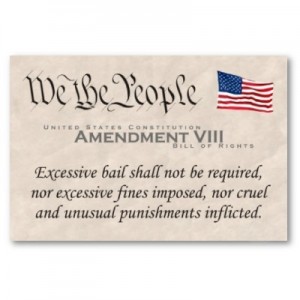A person’s first thought upon landing in jail often is “How can I get out — fast?!”
Because, nobody wants to stay in jail one minute longer than they have to.
The usual way to get out of jail fast is to “post bail.”

24/7 …Because you don’t want anyone you care about to stay in jail one minute longer than absolutely necessary!
Call Now: 804-370-0053
Bail can be cash, a bond, or property that an arrested person puts up to ensure that he or she will appear in court when ordered to do so. If the defendant doesn’t show up, the court keeps the bail and issues a warrant for the defendant’s arrest.
How Bail Is Set
Judges set the amount. Because many people want to get out of jail immediately , many jails have standard bail schedules that specify the amounts for common crimes. An arrested person can often get out of jail quickly by paying the amount set forth in the station house schedule.
How does bail work?
This YouTube video entitled “How do Bail Bonds Work” is done by a legal expert:
If a suspect wants to post bail but can’t afford the amount required by the bail schedule, the suspect can ask a judge to lower it. Depending on each state’s procedures, a request for lower bail may be made either in a special setting or hearing or when the suspect appears in court for the first time.
The Eighth Amendment to the Constitution requires that bail not be excessive. This means that bail should not be used to raise money for the government or to punish a person for being suspected of committing a crime. The purpose of bail is to allow the arrested person to remain free until convicted of a crime, and the amount of bail must be no more than is reasonably necessary to keep the suspect from fleeing before a case is over.
So much for theory. In fact, many judges set an impossibly high amount in particular types of cases (such as those involving drug sales or rape), knowing that the high bail will effectively keep the suspect in jail until the case is over. Although bail set for this purpose — called preventative detention — is thought by many to violate the Constitution, courts have uniformly rejected this argument (the issue has never been decided by the U.S. Supreme Court, the ultimate arbiter of what is and is not constitutional).
Conditions of Bail
Bailed-out suspects commonly must comply with “conditions of release.” If a suspect violates a condition, a judge may revoke bail and order the suspect re-arrested and returned to jail. Some bail conditions, such as a requirement that a suspect “obey all laws,” are common. Other conditions may reflect the crime for which a suspect was arrested. For example, a judge may order a domestic violence suspect not to contact the complaining witness.
Paying Bail
Bail can take the following forms:
- cash or check for the full amount of the bail
- property worth the full amount
- a bond (that is, a guaranteed payment of the full bail amount), or
- a waiver of payment on the condition that the defendant appear in court at the required time (commonly called “release on one’s own recognizance”).
A bond that costs 10% of the bail amount may sound like a good deal compared to posting cash bail, but buying a bond may cost more in the long run. If the full amount of the bail is paid, it will be refunded (less a small administrative fee) when the case is over and all required appearances have been made.
In contrast, a bail bondsman’s fee is nonrefundable. In addition, the bond seller may require “collateral”. This means that the person who pays for the bail bond must also give the bond seller a financial interest in some of the person’s property. The bond seller can cash in on this interest if the suspect fails to appear in court.
…
More Information:
To learn more about bail, and everything else you need to know about criminal law, get The Criminal Law Handbook: Know Your Rights, Survive the System, by Paul Bergman and Sara J. Berman (Nolo). If you need a lawyer, you can turn to Nolo’s trusted Lawyer Directory, to find a criminal defense attorney in your area.

